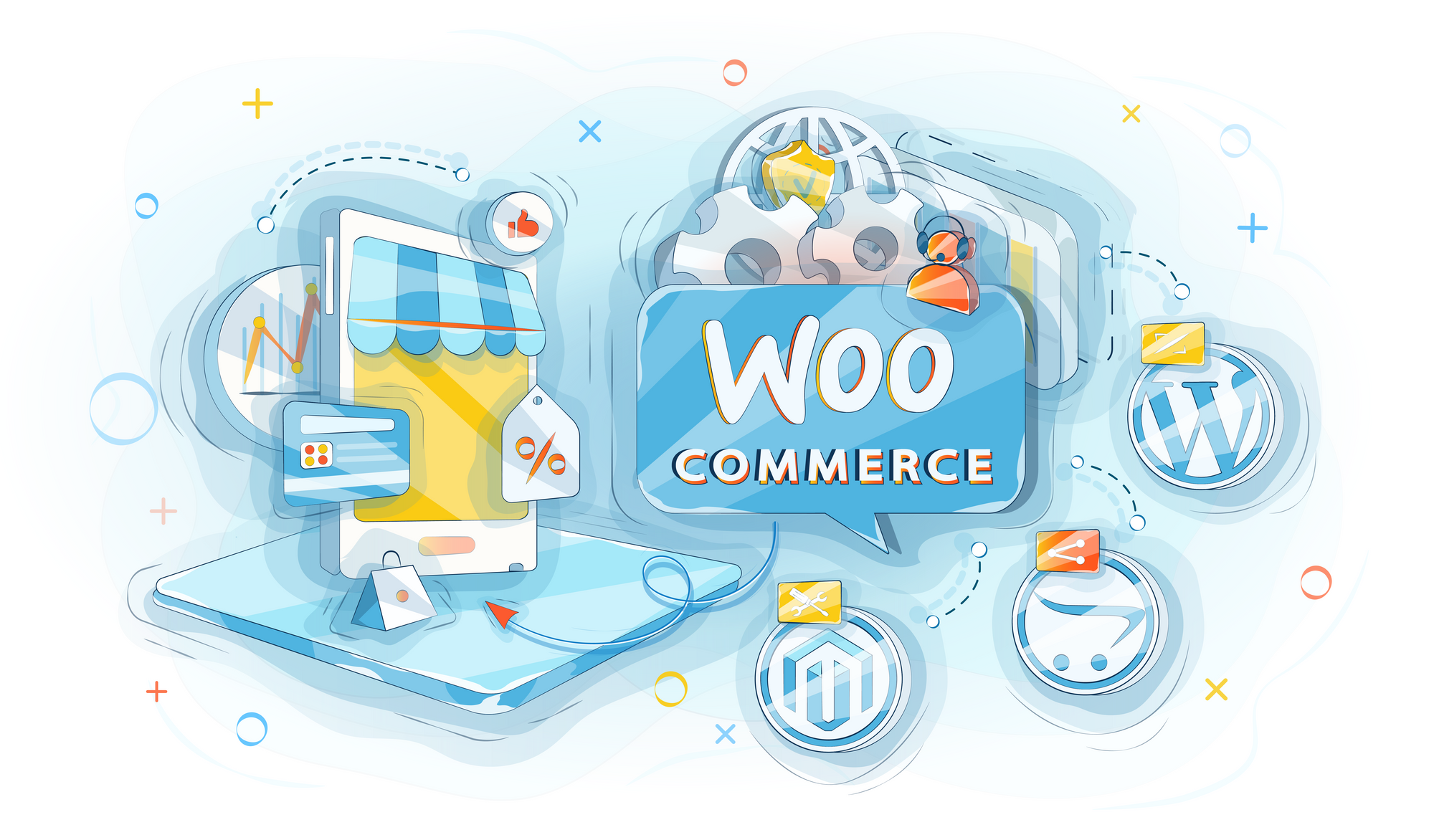Choosing a content management system is a mandatory stage of working on any online project, but it's even more important when creating an online store. Nowadays, there are many CMS available, all having different advantages and disadvantages. We've been talking about some of them in this publication. Today we will focus on the e-commerce sphere. So, let's have a look at the most popular content management systems and extensions, all designed for online sales. Those include WooCommerce plugin for WordPress, OpenCart, and Magento.
WordPress (WooCommerce plugin)
WordPress has been a leader among CMS for many years. According to recent studies (conducted in March 2020), there are 44.79% sites in runet and 35.8% sites around the globe using this system. WordPress is considered to be a universal CMS, which can be used for sites of different directions, including blogs, business cards, single-pages, news portals, and commercial platforms. It is very convenient to use this system in the e-commerce sphere, but there is one tiny nuance: it's impossible to use it without additional plugins if we are talking about online stores.
There are several very effective extensions in WordPress.WooCommerce is the most popular solution. Users are also welcome to use different alternative options, like Jigoshop, eShop, Cart66, and others. However, WooCommerce remains the leader, so we'll focus on this plugin.
WooCommerce Overview
WooCommerce is a free open source plugin that works on WordPress sites directly. Since it was firstly released in 2011, it has been downloaded more than 84 million times. The main reason for its popularity is a huge number of important functions that increase sales performance. Besides, this plugin can be integrated into the WordPress platform, which is used by the majority of people around the globe.
WooCommerce Advantages
WooCommerce is a plugin that ensures the full operation of the online store. Besides, it helps to regulate sales, conduct analytics, and develop your own business. The main advantages of this plugin are the following:
- Open Source. The developers of the plugin have almost unlimited options for editing it.
- Expansions. Hundreds of enhancements are available for WooCommerce, which makes it easier to add new features in online stores. Also, a collection of themes is available for those using this plugin. So, the user has a variety of options choosing a design and layout for his site.
- Sales possibilities. WooCommerce makes it possible for users to sell both physical and digital goods. Thus, using this plugin, the owner of an online store can easily sell e-books, music, software, and many other types of virtual products.
- Marketing tools. Using WooCommerce features, online store owners can quickly launch promotions and discounts. Besides, it is possible to install widgets to show visitors the recommended positions.
- Directory Management. Basic WooCommerce tools make it possible for users to manage items on the website easily. Using it, one can add all the necessary categories, new items, and edit product cards as well.
- Payment and delivery. WooCommerce supports many popular payment systems and delivery services (built-in). For example, one can connect a Single Cash Desk or accept payments directly. The plugin also allows users to calculate taxes depending on a country or region of his/her residence.
Full and comprehensive documentation on WooCommerce can be found on the Internet. In addition, one can get acquainted with the information presented in the knowledge base. Besides, the user community often answers the most frequent questions. One can find all the answers on a specialized forum.
Disadvantages
Despite its popularity, this plugin has several disadvantages. Those are the following:
- Hosting Choice. A significant burden is created by WooCommerce when managing a large store with thousands of goods. To ensure stable and uninterrupted operation, it's of vital importance to choose powerful hosting.
- West orientation. When developing this plugin and its extensions, developers mainly focused on the Western market, which led to some difficulties when being used on Russian websites.
However, these minor drawbacks do not make WooCommerce a bad choice for an online store development on WordPress. It can be used for small and large stores.
OpenCart
OpenCart is one of the top five CMS available in the runet (those include WordPress, 1C-Bitrix, and Joomla!). This engine is used on 3.26% of Russian-language sites. At the same time, this system is a leader among platforms specializing in online stores.
OpenCart Overview
OpenCart is a system designed to be used in e-commerce. This is an open-source CMS that is available for free.
OpenCart Advantages
Top advantages of OpenCart include:
- Intuitively understandable interface. A friendly user interface is one of the nicest OpenCart features. This CMS can be used even by beginners. There is no need for puzzling out how to navigate the toolbar for a long time, spending weeks trying to understand it and getting used to it.
- Numerous extensions. Plugins are available for users to help them make sales more effective and increase the revenue of companies.
- Customization possibilities. Simple architecture and open source allow users to adapt sites to their needs.
- Multilingualism. It's easy to localize an online store that uses OpenCart in different countries. The system integrates with the Crowdin service, so this factor (and several others) make it possible.
- Thought-out analytics system. Sales analysis and reporting are two important aspects of any online business. OpenCart allows users to determine the profitability of any business easily. Besides, users can get acquainted with different advertising campaigns' algorithms of work and get to know lots of other important things.
Speaking about other advantages, we should also mention a full-fledged Russian version. If there are any problems, a user will be able to solve those having a look at answers to many questions provided by a wide community of users.
OpenCart Disadvantages
Nothing is perfect, so OpenCart users often mention the following disadvantages:
- You'll have to pay for customer support. The flip side of the OpenCart is limited user support. To solve the problem completely, you'll have to pay for the technical support service. So, you can freely access the system, but it's better to take additional costs into account.
- There may be errors in the checkout process. Many users face the fact that the checkout process on the website that uses OpenCart can be a little slow. This problem is frequent on sites with a huge selection of goods. However, the problem can be solved by installing additional plugins that will speed up the process.
- A need for installing various add-ons and plugins. There are many applications that are available already, which is a big plus, but a need for expanding standard CMS functions can be considered one of the disadvantages. If you want to use the base potential of OpenCart to the maximum, you'll have to improve it with the help of some extensions.
Besides, when installing extensions, you should also understand that third-party applications can work incorrectly or conflict with each other. They can even make the site vulnerable, so take it into account.
Magento
Magento is considered one of the most reliable, flexible, convenient, and scalable platforms in the e-commerce market. Despite its numerous advantages, it is less popular than the platforms we have already discussed. According to recent studies, this system is used only on 0.26% of sites in the runet.
Magento Overview
Similarly to OpenCart, Magento is a content management system that was developed for e-commerce. This CMS offers a wide range of powerful tools that help users to develop and manage webshops. Magento is freely available in the Community Edition, but there are also several editions you'll have to pay for.
Magento Advantages
Magento has gained popularity due to its flexibility and numerous developmental tools available. Main advantages of this system include:
- Multifunctionality. Magento offers a good selection of ready-made functions for business management. For example, one can manage multiple stores using a single administrative panel.
- Scalability. Magento is easy to scale, so it is suitable for small sites whose owners are thinking about expanding the business adding new categories and products.
- Flexibility. A website on Magento can be adapted to any field of sales, regardless of what products are sold in a webshop. This platform is an open-source one, so it's easy to modify it, customize templates, and develop functionality.
- SEO friendliness. Some systems one can use for free require additional plugins to ensure good optimization. Magento offers built-in SEO features that can help to lift an online store to high positions in search results.
As for developers, a large community of users is an additional advantage for them. There is also a Russian-language community, so its participants can quickly and easily find solutions to any problems that may arise working with a webshop.
Magento Disadvantages
As we have previously discussed, Magento has many advantages, but this system also has several significant disadvantages:
- One need website development skills to use it. Magento is unlikely to be suitable for beginners. It's complicated to administer and configure the Magento platform. For those of weak technical skills, an online store development may seem difficult. Besides, it takes some time even for experienced and qualified developers to learn how to configure and use Magento using all its functions.
- The development takes lots of time. Magento is a multilevel software. Its complex architecture makes the site development process rather time-consuming.
- Hosting requirements. The system requires a good environment for store management. Magento requires reliable hosting that will meet all the engine requirements.
Another minus of the Magento system (speaking about runet) is the insufficient number of localized extensions. It's possible to solve the problem using the Russian-language version of the engine, which is integrated with such popular services, as Yandex, 1С, and others. But in this case, you will have to pay for using CMS.
What else is needed for an online store creation?
What else is needed for an online store creation?
Whatever content management system you choose, another thing you have to think about is site security. No one is immune to DDoS attacks, so preventive measures are the most effective way to be protected.King Server offers users opportunities for a VPS rent (where you will be able to post your site). We also offer anti-DDos protection. Using this protection, you will have your online store working stably even in case of cyber attacks launched by unscrupulous competitors. So, if you want to learn more and ask questions, just contact us!

























